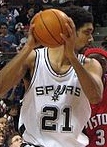(This is another in a series of 30 guest columns that will run in October, when optimism reigns supreme across the NBA. The theme will be “Five Reasons to Feel Positive About … ” We encourage you to follow the authors on Twitter and visit their sites. – CS)
 The fact that the San Antonio Spurs managed to win 50 games in the 66-game lockout-reduced slate should not be a mere footnote; it is remarkable. Translated over a normal schedule, the Spurs would have won 62 games, a feat that has only been accomplished 10 times since the 2000-01 season.
The fact that the San Antonio Spurs managed to win 50 games in the 66-game lockout-reduced slate should not be a mere footnote; it is remarkable. Translated over a normal schedule, the Spurs would have won 62 games, a feat that has only been accomplished 10 times since the 2000-01 season.
So while they were promptly ousted by the athletically superior Oklahoma City Thunder in the Western Conference Finals – with four consecutive losses following 20 straight wins, no less – the essential tenets of last season’s squad are in place.
Those tenets are still productive even at their advanced state. Tim Duncan is still a dominant defender. Manu Ginobili remains the same quirky, lefthanded maestro – especially in the pick-and-roll – that everyone is infatuated with. Tony Parker is one of the fastest players in the league and, as the focus of the Spurs’ top-ranked offense, is extremely difficult to impede both in transition and the half-court. Gregg Popovich is, well, a genius. (And he’s still witty, too.)
This is a good thing, mostly. It doesn’t mean that the Spurs are any more likely to defeat the Thunder or the Los Angeles Lakers in a playoff series. But it also means that the Spurs remain in title contention, even if it’s on the fringe. Here are five reasons to feel positive about the Spurs:
1. Kawhi Leonard can improve (and Danny Green can, too)
Having traded fan favorite George Hill for Kawhi Leonard was a telling sign for the rest of the league. The Spurs viewed Leonard as a long-term solution and a cost-effective rotation piece (re-affirmed by Hill’s new five-year, $40 million contract). Leonard, meanwhile, is set to earn less than $7 million before he enters restricted free agency in three years.
Leonard entered the fray as an unproven, untested forward with a considerable amount of potential. Not a lot of polish, just potential. Working with Spurs shooting coach Chip Engelland helped rectify hitches in his shot. As a result, he hit 37.6 percent of his 3-pointers in his rookie season. From the corner alone, Leonard made 47 percent.
Although he succeeded in a limited role last season, Leonard still can make significant improvements as a defender – especially against screens – and as a shot creator. Popovich already is deviously experimenting with the 21-year-old as the ballhandler in the pick-and-roll. Realistically, in a full season, Leonard could easily refine his game further. And that is a scary thought.
Similarly, shooting guard Danny Green could be in line for improvements as well. Last season was essentially his first, having spent the majority of his tenure in Cleveland on the bench. In San Antonio, Green was an active defender and proficient perimeter shooter, burying 3-pointers at 43.6 percent. A prototypical 3-and-D player – in other words, a player that plays defense and shoots from the perimeter – look for Green to excel in his starting role.
2. The Spurs didn’t really change
 Though this is seen as a bad thing, it really is not the end of the world. As I briefly touched upon in the introduction, the Spurs are currently constructed to win a lot of games and advance deep into the playoffs. There is no shame in that.
Though this is seen as a bad thing, it really is not the end of the world. As I briefly touched upon in the introduction, the Spurs are currently constructed to win a lot of games and advance deep into the playoffs. There is no shame in that.
Of course, the fanbase expects much more, and I include myself in this belief; anything less than a championship should be considered somewhat of a disappointment. But if the Spurs win games, potentially earning the top seed in the Western Conference for the third consecutive season, and benefit from circumstance, they could sneak into the NBA Finals. The Dallas Mavericks did so and weren’t nearly as equipped to win as the 2012-13 Spurs. Weird things tend to happen in the NBA, and San Antonio may be able to capitalize.